Stay safe from carbon monoxide – PG&E

SAN FRANCISCO — With winter months approaching, customers can take important steps to protect themselves againstthe dangers of carbon monoxide, including using only safe, approved methods for home heating and ensuring that carbon monoxide detectors are installed in their homes and working properly.
According to the Center for Disease Control, every year in the U.S. at least 430 people die from accidental carbon monoxide poisoning and approximately 50,000 people will be sent to the hospital. Carbon monoxide is especially dangerous because it is odorless and can’t be seen, and all California homes are required to have carbon monoxide detectors. Customers can take these steps to protect their homes and their families:
- Carbon monoxide can be emitted from improperly functioning gas appliances, particularly those used for heating and cooking.
- To protect your family against potential exposure, carbon monoxide detectors should be installed on every floor, near sleeping areas and common areas.
- These devices should be tested twice a year, and batteries replaced if necessary.
- Check the date that the detector was manufactured. The sensors in most carbon monoxide detectors have a useful life of five to 10 years.
- Most detectors have an audible signal, usually a series of chirps, which differs from the alarm to indicate low battery, malfunction, or device end of life. Refer to the owner’s manual or the instructions on the back of the detector for more information.
Gas safety tips
- Never use products inside the home that generate dangerous levels of carbon monoxide, such as generators, outdoor grills, or propane heaters.
- Never use cooking devices such as ovens or stoves for home heating purposes.
- Never cover the bottom tray inside an oven with foil or an aftermarket liner.
- When using the fireplace to stay warm, make sure the flue is open so venting can occur safely through the chimney.
- Make sure water heaters and other natural gas appliances have proper ventilation.
- If you suspect carbon monoxide in your home, or if you smellthe distinctive “rotten egg” odor of natural gas in or around their home or business, you should immediately evacuate and then call 911 and PG&E at 1-800-743-5000.
- Click herefor more gas safety tips.
- For more information about preparedness resources, visit PG&E’s Safety Action Center.

